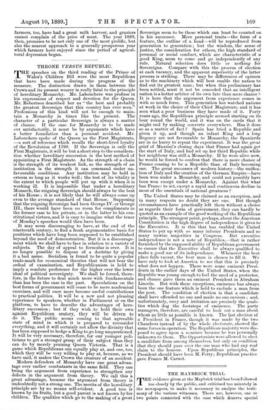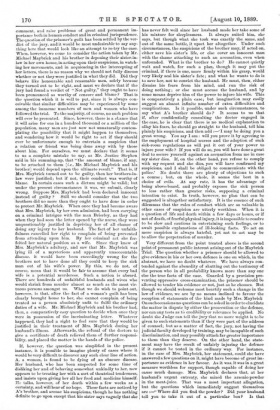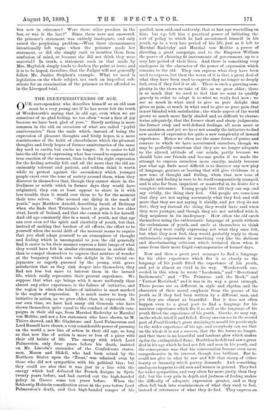THE MAYBRICK TRIAL. T HE evidence g iven at the Maybrick trial
has been followed too closely by the public, and criticised too minutely in the newspapers, to make it necessary to analyse the testi- mony of the various witnesses. There are, however, one or two points connected with the case which deserve special comment, and raise problems of great and permanent im- portance both in human conduct and in criminal jurisprudence. The question of the prisoner's guilt has been settled by the ver- dict of the jury, and it would be most undesirable to say any- thing here that would look like an attempt to re-try the case. When, however, we come to consider the action taken by Mr. Michael Maybrick and his brother in deposing their sister-in- law in her own house, in acting upon their suspicions, in watch- ing her movements, and in acquiescing in the intercepting of her letters, there is no reason why we should not fully discuss whether or not they were justified in what they did. Did they behave like honourable and reasonable men, solely because they turned out to be right, and must we declare that if the jury had found a verdict of "Not guilty," they ought to have been pronounced as worthy of censure and blame P That is the question which it is well to put, since it is always con- ceivable that similar difficulties may be experienced by some among the immense numbers of men and women who have followed the trial. To the majority, of course, no such problem will ever be presented. Since, however, there is a chance that it will arise for one in a hundred thousand or a million of the population, many men are just now not unnaturally contem- plating the possibility that it might happen to themselves, and wondering how it would be right to act if they should ever be unfortunate enough to entertain a suspicion that a relation or friend was being done away with by those about him. For ourselves, we must declare that it seems to us a complete mistake to say, as Mr. Justice Stephen said in his summing-up, that "the amount of blame, if any, to be attached to them [i.e., Mr. Michael Maybrick and his brother] would depend upon the ultimate result." That is, if Mrs. Maybrick turned out to be guilty, then her brothers-in- law were justified ; but if not, their conduct was worthy of blame. In certain cases such a dictum might be valid; but under the present circumstances it was, we submit, clearly wrong. Suppose Mrs. Maybrick had been declared innocent ; instead of guilty P Still we should consider that the two brothers did no more than they ought to have done in order to protect Mr. Maybrick. When once they had become aware that Mrs. Maybrick, by her own admission, had been carrying on a criminal intrigue with the man Brierley, as they had when they had seen the letter opened by the nurse, they were unquestionably justified in depriving her of all chance of doing any injury to her husband. The fact of her unfaith- fulness cancelled her right to complain of being prevented from attending upon him. By her criminal act she for- feited her natural position as a wife. Since they knew of Mrs. Maybriek's adultery, and saw that Mr. Maybrick was lying ill of a mysterious and apparently unaccountable disease, it would have been exceedingly wrong for the brothers not to have done all they could to keep the sick man out of his wife's power. By this, we do not, of course, mean that it would be fair to assume that every bad wife is a potential murderess. Such a notion is absurd. There are hundreds of unfaithful husbands and wives who would shrink from murder almost as much as the most vir- tuous persons amongst us. What we do wish to point out, however, is that, after the fact of a woman's guilt has been clearly brought home to her, she cannot complain of being treated as a person absolutely unfit to fulfil the ordinary duties of a wife. Mr. Michael Maybrick and his brother had, then, a comparatively easy question to decide when once they were in possession of the incriminating letter. Whatever happened, they had a right to feel sure that they would be justified in their treatment of Mrs. Maybrick during her husband's illness. Afterwards, the refusal of the doctors to give a certificate of death relieved them of further responsi- bility, and placed the matter in the hands of the police.
If, however, the question was simplified in the present instance, it is possible to imagine plenty of cases where it would be very difficult to discover any such clear line of action. A, a woman, is found to be dying of an obscure disease. Her husband, who has been suspected for some time of disliking her and of behaving somewhat unkindly to her, now appears to be treating her with a sort of theatrical tenderness, and insists upon giving her all her food and medicine himself. He talks, however, of her death within a few weeks as a certainty, and will heax of no hope. These facts are noticed by A's brother, and arouse his suspicions, though he has nothing definite to go upon except that his sister says vaguely that she has never felt well since her husband made her take some of his mixture for sleeplessness. It always suited him, she says, but though what she took was exactly the same, and out of the same bottle, it upset her altogether. Under such circumstances, the suspicions of the brother may, if acted on, either save his sister's life, or else cover an innocent man with the shame attaching to such an accusation, even when unfounded. What is the brother to do P He cannot quietly wait and watch, for such a plan, though it may put the criminal, if there is one, more firmly within his grasp, would very likely seal his sister's fate; and what he wants to do is to save her, not to convict the husband. He must, then, either dismiss his fears from his mind, and run the risk of doing nothing ; or else must accuse the husband, and by some means deprive him of the power to injure his wife. This is comparatively a plain case; but imagination may easily suggest an almost infinite number of extra difficulties and complications. Is it possible, under such circumstances, to say what A's brother should do ? It seems to us that if, after confidentially consulting the doctor engaged in the case, he is clear that there is no medical explanation to allay his fears, he should go straight to the husband, tell him plainly his suspicions, and then add I may be doing you a great wrong. You say I am : will you prove it by agreeing to the employment of hospital nurses and the adoption of such sick-room regulations as will put it out of your power to injure your wife ? If you will do so, you will have done a great deal to secure yourself against an accusation from me in case my sister dies. If, on the other hand, you refuse to comply with my request and she dies, you will have confirmed my suspicions, and I shall be obliged to communicate with the police.' No doubt there are plenty of objections to such a course ; but, on the whole, it seems the best in a choice of evils. At any rate, it has the advantage of being above-board, and probably exposes the sick person to less rather than greater risks, supposing a criminal intention to exist. In truth, however, no plan that can be suggested is altogether satisfactory. It is the essence of such dilemmas that the rules of conduct which are so valuable in other cases of suspicion are utterly worthless. When it is a question of life and death within a few days or hours, or if not of death, of fearful physical injury, it is impossible to resolve to be slow and cautious in entertaining such feelings, or to await possible explanations of ill-looking facts. To act on mere suspicion is always hateful, yet not to act may be to allow the perpetration of murder.
Very different from the point treated above is the second point of permanent public interest arising out of the Maybrick Trial. The question whether a prisoner should be allowed to give evidence in his or her own defence is one on which, in the abstract, we have no doubt whatever. We have always con- tended against the absurdity of shutting out the testimony of the person who in all probability knows more than any one else the true facts of the case. Guarded by a provision pre- venting oppressive cross-examination, the prisoner should be allowed to tender his evidence or not, just as he chooses. But though we should welcome most heartily such a change in the law of eifidence, we are by no means inclined to favour the reception of statements of the kind made by Mrs. Maybrick On such occasions no questions can be asked in order to elucidate the matter in dispute by either the prosecution or the defence, nor can any tests as to credibility or relevance be applied. No doubt the Judge can tell the jury that no more weight is to be given to such statements than if they were part of the address of counsel; but as a matter of fact, the jury, not having the judicial faculty developed by training, may be incapable of such discrimination, and may possibly attach far greater importance to them than they deserve. On the other hand, the state- ment may have the result of unfairly injuring the defence if it cannot be tested in the ordinary way. For instance, in the case of Mrs. Maybrick, her statement, could she have answered a few questions on it, might have become of great im- portance as evidence in her favour. As it was, it was in a great measure worthless for support, +hough capable of doing her cause much damage. Mrs. Maybrick declares that, at her husband's urgent entreaty, she mixed the arsenic-powder in the meat-juice. That was a most important allegation, but the questions which immediately suggest themselves are :—" Where did you -fad the powder P Did your husband tell you to take it out of a particular box? Is that
box now in existence ? Were there other powders in the box, or was it the last ?" Since these were not answered, the prisoner's statement was entirely inadequate, and only raised the perplexing problem,—Were these circumstances intentionally left vague when the prisoner made her statement, or did she simply omit to mention them from confusion of mind, or because she did not think they were material ? In truth, a statement such as that made by Mrs. Maybrick simply tends to darken the point at issue, and it is to be hoped, therefore, that the Judges will not generally follow Mr. Justice Stephen's example. What we need is legislation on the whole subject, not such an imperfect sub- stitute for an examination of the prisoner as that afforded us in the Liverpool trial.




































 Previous page
Previous page